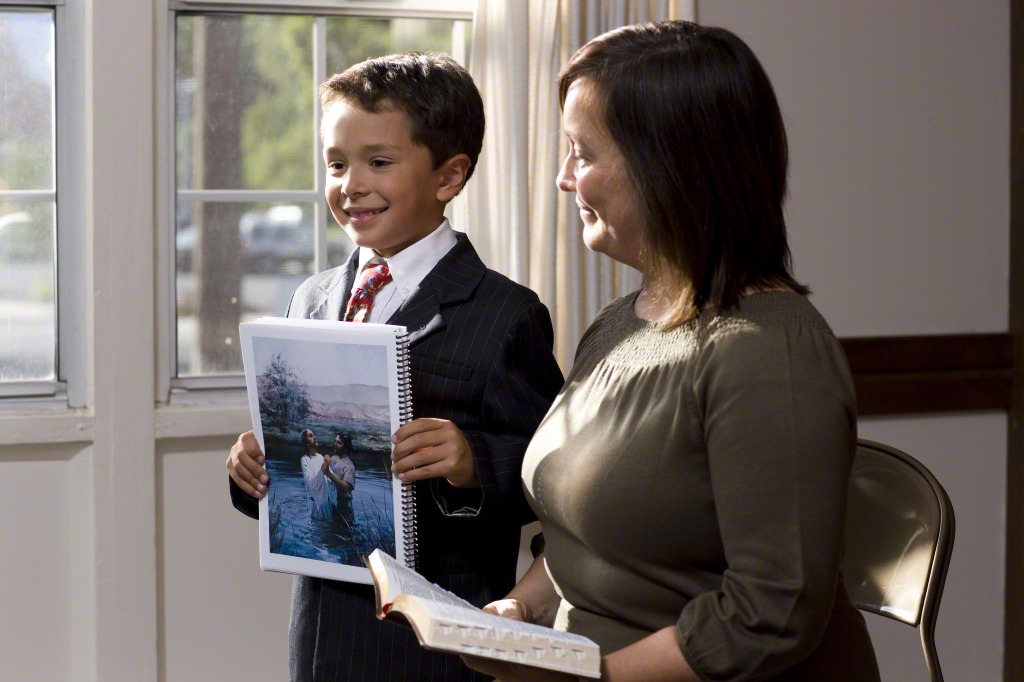Thou shalt love thy neighbour as thyself. (Matt. 22:39.)
One morning while the Prophet Joseph Smith was visiting with a group of men in front of his house in Nauvoo, a man came up and reported that the house of a poor brother who lived some distance from town had burned down the night before.
All of the men said they felt sorry for the man. But the Prophet put his hand into his pocket, took out some money, and said, “I feel sorry for this brother to the amount of five dollars. How much do you feel sorry?”
Love your enemies … that ye may be the children of your Father which is in heaven. (Matt. 5:44–45.)
It seemed impossible for Pat and Peggy to make any friends in the strange big city where they had just moved.
One night Father noticed their sadness. “Let’s have a party,” he suggested.
At first Pat and Peggy were delighted. They talked excitedly of ice cream and cake and big red balloons, but then they stopped. “Who can we invite to a party?” they cried. “We don’t have any friends.”
Father’s eyes twinkled as he answered, “Oh, we won’t worry about inviting friends right now. Let’s have an Enemy Party. We’ll just invite all those unfriendly boys and girls in your class at school and see what happens.”
That is exactly what Pat and Peggy did. Almost everyone came who was invited, and when they left, they all said it was the best party they’d ever attended.
Even though everyone had a wonderful time, Pat and Peggy never had another Enemy Party. They no longer knew anyone to invite, because suddenly they had only friends at the new school!
Love one another, as I have loved you. (John 15:12.)
The life of Jesus was an example of love. Not only did He teach men to love our Heavenly Father and each other, but He was always a perfect example of what He taught.
On the Thursday before Easter, Jesus met with His disciples in an upper room of a house in Jerusalem. There they ate their last meal together, a meal that has become known throughout the ages as the Last Supper.
After eating, Jesus left the table, took a basin of water, and bathed the feet of those who were with Him. When one of the disciples asked why Jesus washed their feet, Jesus explained that the master is no greater than the servant in the kingdom of God.
Then Jesus broke bread and poured drink. He blessed both and passed them to the others. This was the beginning of the passing of the holy sacrament.
The disciples of Jesus were sad, for as the evening went on, Jesus told them He would soon leave them. In a quiet, loving voice, He said, Little children, yet a little while I am with you.
A new commandment I give unto you, That ye love one another; as I have loved you, that ye also love one another.
By this shall all men know that ye are my disciples, if ye have love one to another. (John 13:33–35.)
Since that time many have accepted the invitation of Jesus, “Come, follow me.”
Thou shalt love thy neighbour as thyself. (Matt. 22:39.)
“Happy birthday, Heber!” exclaimed his mother as she handed him the most beautiful coat he had ever seen. He hugged it close and his eyes were bright with happiness. He knew how difficult it had been for his mother to make it, and he could hardly wait to go out in the cold and feel its warmth around him.
One day as Heber was hurrying on an errand, he saw a boy in a thin sweater shivering with cold. As he hurried by, the boy looked at Heber’s coat with such longing that, almost before he knew what he was doing, Heber stopped, took off his new coat, and gave it to the boy.
When Heber’s mother saw her son wearing his old coat instead of the new one, she asked what he had done with his lovely new overcoat.
“Oh, Mother,” Heber J. Grant explained, “I saw a boy who needed it lots worse than I, so I gave it to him.”
If ye love me, keep my commandments. (John 14:15.)
“We’d like you to be our regular pitcher this year, David,” the coach said at the beginning of the baseball season. “But you’ll have to play on Sunday sometimes.”
“I’ll have to think about it,” David replied.
That night David said a special prayer and asked for help to have the courage to do what he knew was right.
The next day he told the coach he had decided not to play ball on Sunday. “I guess I’ll just have to be a relief pitcher,” he said.
Several weeks went by. David tried not to think about his team playing ball each Sunday while he went to church with his family.
One night after practice the coach called the boys together. “Even though David doesn’t feel he can play ball on Sundays,” he said, “I’d like him to be our regular pitcher. If you agree, we can have a relief pitcher for our Sunday games.”
There was a moment of silence. “How about it?” the coach asked the boys.
David could hardly breathe as he looked at his friends. They were quiet for only a minute, and then every team member enthusiastically approved the coach’s relief pitcher plan.
Greater love hath no man than this, that a man lay down his life for his friends. (John 15:13.)
A little girl was critically ill. She needed a special kind of blood for a transfusion to save her life.
Her brother had the same type of blood. The doctors asked him if he would be willing to give his blood so his sister might live. Without hesitating, the young boy answered, “Sure!”
After the blood transfusion was completed, the brother turned to the doctor and asked softly, “Now, sir, when will I die?”
It took only a moment for the doctor to realize the young boy had thought that giving blood to his sister would kill him. But he was willing to die for her.
Talk Source:



